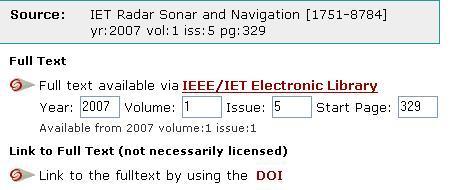Some months ago, I wrote a blog entry called “SFX and DOI: sometimes just a pain in the neck” and it paid back today. My own post helped me solving a similar problem without spending too many thoughts… thank me!
More details? The issue was raised on some mailing lists first and can be described in four bullet points:
- IEEE Xplore only provides article level linking via CrossRef/DOI,
- users from MPG do have access to IET content via Xplore,
- CrossRef redirects DOI links for IET content to the IET Digital Library (see http://dx.doi.org/10.1049/iet-rsn:20060134),
- but unfortunately, this is not the place where users from MPG have full text access.
Following our own instructions, we now redirect requests for full texts published on the Xplore platform only via CrossRef if the doi site key is assigned to IEEE. The downside is that only a link to the table of contents can be provided for IET content.
Example: In the MPG/SFX menu below, the link "IEEE/IEE Electronic Library" leads to the table of contents on Xplore, while the “DOI” link still resolves to the content on the IET Digital library.

Jeff Pache (IET Publishing Services & Product Development Manager) meanwhile announced that IET and IEEE will register secondary URLs pointing to Xplore at CrossRef. This is already done for some articles, see http://dx.doi.org/10.1049/ip-smt:20050087.
This is a huge improvement indeed, but – from the link resolver perspective – will resolve the problem only partially. The link resolver is supposed to figure out the appropriate copy without displaying any intermediate screens to its customers. From our point of view, IEEE Xplore requires an independent article level syntax. We requested this… let’s see what happens!
